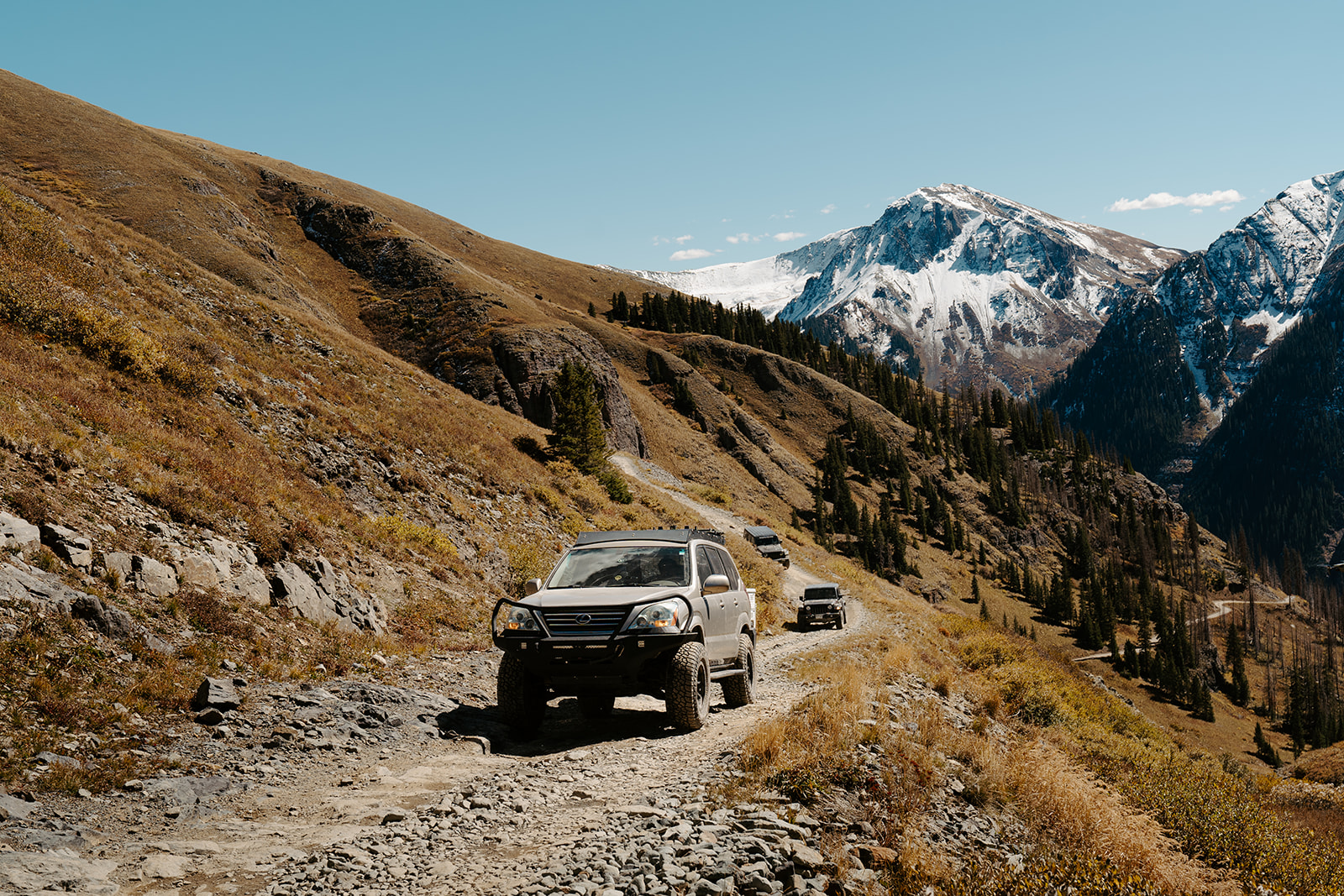hELLO!
We are a husband & wife team. Based in the mountains of Montana & Washington State, we’ve been photographing and filming couples since the start of 2021.
Welcome to our blog where you’ll discover elopement planning resources, as well as beautiful galleries from real weddings!
We're Hannah & Adam of Venture to Elope
View all
elopements
Resources
Couples
Small Weddings
Off-Roading Elopement Adventure in Colorado
Table of Contents
What Time of Year Should You Elope in Colorado?
Using Your Own Vehicle vs. Renting a 4×4 Vehicle
How Much Time Do You Want To Spend Driving?
What Kind of Views Do You Want?
Safety Gear For Any Off-Roading Adventure
Your Off-Roading Elopement Photo + Video Team
We are a husband + wife team based in Montana and the Pacific Northwest, traveling all over the world for elopements.
Providing you and your partner a space to feel safe, special, and comfortable is our ultimate goal! With hundreds of miles of off-road travel under our belt, we can help guide you and your guests along your journey to your epic off-road elopement.

What Time of Year Should You Elope In Colorado?
Picking the right time of year is one of the most important decisions. Many trails become impassable during the “off season” (winter months), and your options for camping may be extremely limited. The ideal time to choose for your off-roading elopement adventure would be from late June to late September. By June, most trails should be open, with the exception of some high passes where the tops may still be covered with snow.
“Off Season” – Aka Winter
November through April is winter throughout most of Colorado. During these months, we don’t recommend off-roading because naturally, the roads will be impassable.
Transition Months
The transitional months are times when snow is melting. So, that’s typically all of May. Higher elevations will have snow until June, though. It’s safest to plan your trip outside of these months because you never know if the snow will be fully melted or not.
Summer
Late June through August is the perfect time for hiking and off-roading in Colorado! Everything has melted and all of the 4×4 trails are accessible. You can expect longer summer days, and hotter temperatures.
Fall Months
The end of September and the beginning of October is fall in Colorado. You can expect lots of beautiful colors with the aspen trees!
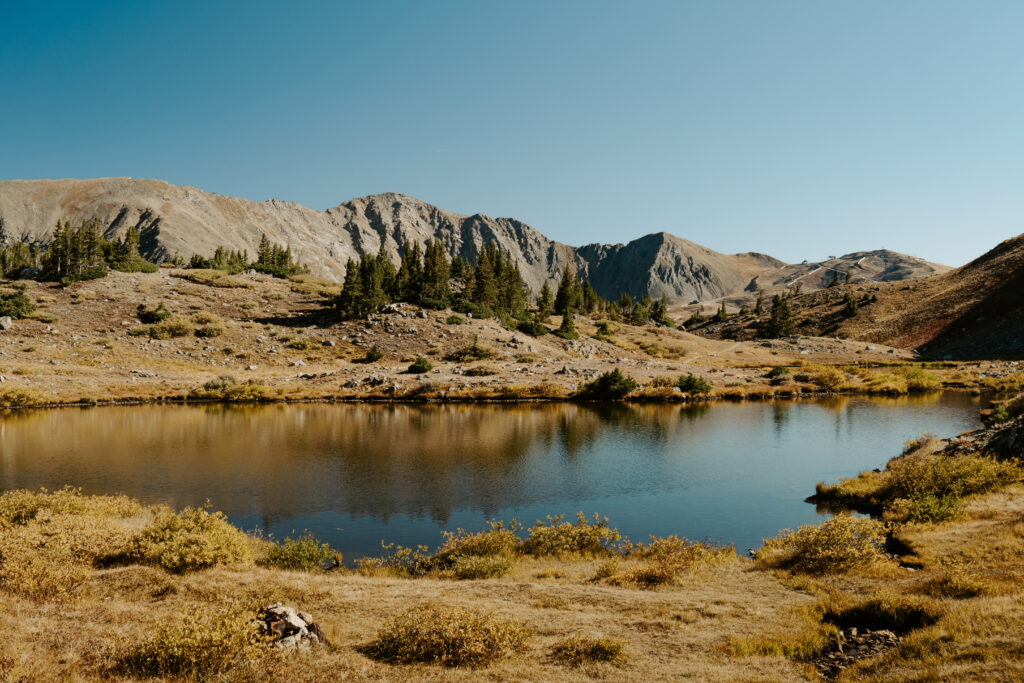
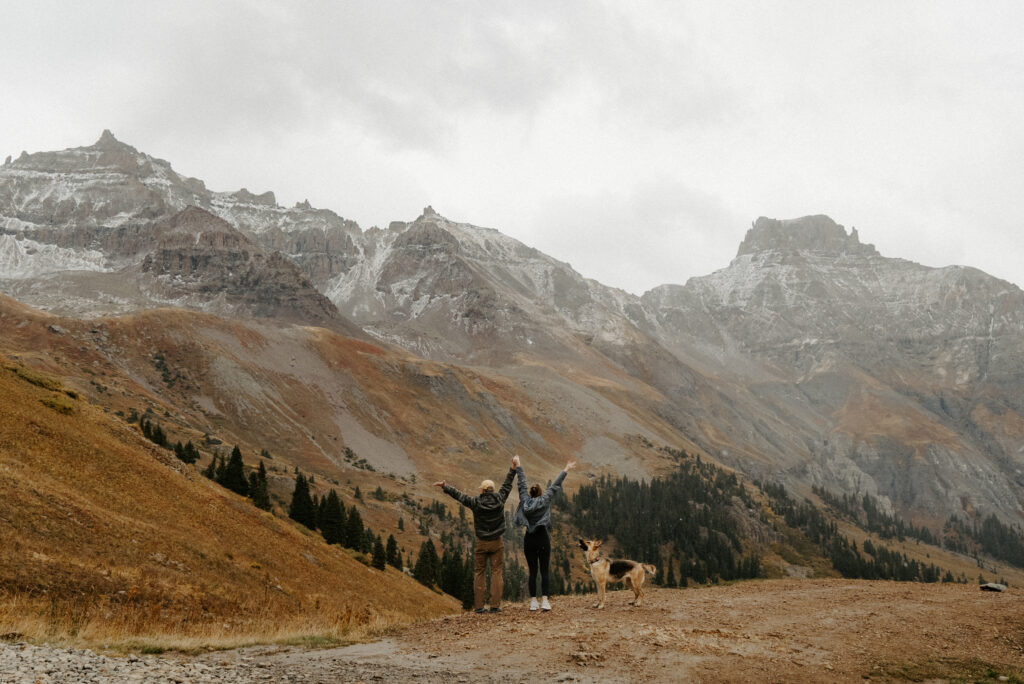
Colorado Weather Conditions
It’s important to be aware of weather conditions in Colorado, especially in the mountains. If you aren’t local to the area, make sure you read up on what kind of weather you could experience during your trip. This will help you pack appropriately and have realistic expectations of what your elopement could look like.
1. Severe Thunderstorms: Colorado is prone to severe thunderstorms, which can bring hail, high winds, heavy rain, and potential flash flooding. Thunderstorms are particularly prevalent in the spring and summer months from the Front Range to the eastern plains.
2. Flash Flooding: Thunderstorms and heavy rain can lead to flash flooding. We’ve been caught on a 4×4 road when a flash flood occurred, and trust me when I say it’s extremely scary! If you get stuck on a trail while it’s flooding, do not continue driving. Wait until the storm subsides.
3. High Winds: High winds are frequent in Colorado, especially during thunderstorms and snowstorms, and at high elevations (like in the mountains). These winds can reach dangerous speeds, and can cause damage to property or trees.
4. Wildfires: Wildfires are a common occurrence, especially during the summer months. High temperatures, low humidity, and strong winds can combine to create dangerous fire conditions. This can cause 4×4 road closures, which means we should always have a backup plan in place!
How To Get To Colorado
We recommend flying into Denver International Airport (DEN) or Colorado Springs Airport (COS) for any adventures in Colorado. Both airports are serviced by many major airlines, making them easy to access from other parts of the country. Flying means that you’ll have to rent a vehicle. But there are several vehicle rental companies that can pick you up from the airport, which is awesome! Services like this can simplify your travel and make it convenient to get into your off road vehicle sooner. Definitely check out our section below on renting vs. using your own vehicle to help you navigate this!
If you choose to drive yourself, Interstate highways 25, 70, and 76 all run through Colorado, making it another easy way to access the state from other parts of the country. This is the best way to go if you want to use your own rig for your off-roading elopement! You also tend to have more leeway in your planning if you use your own vehicle because some rental companies are seasonal.
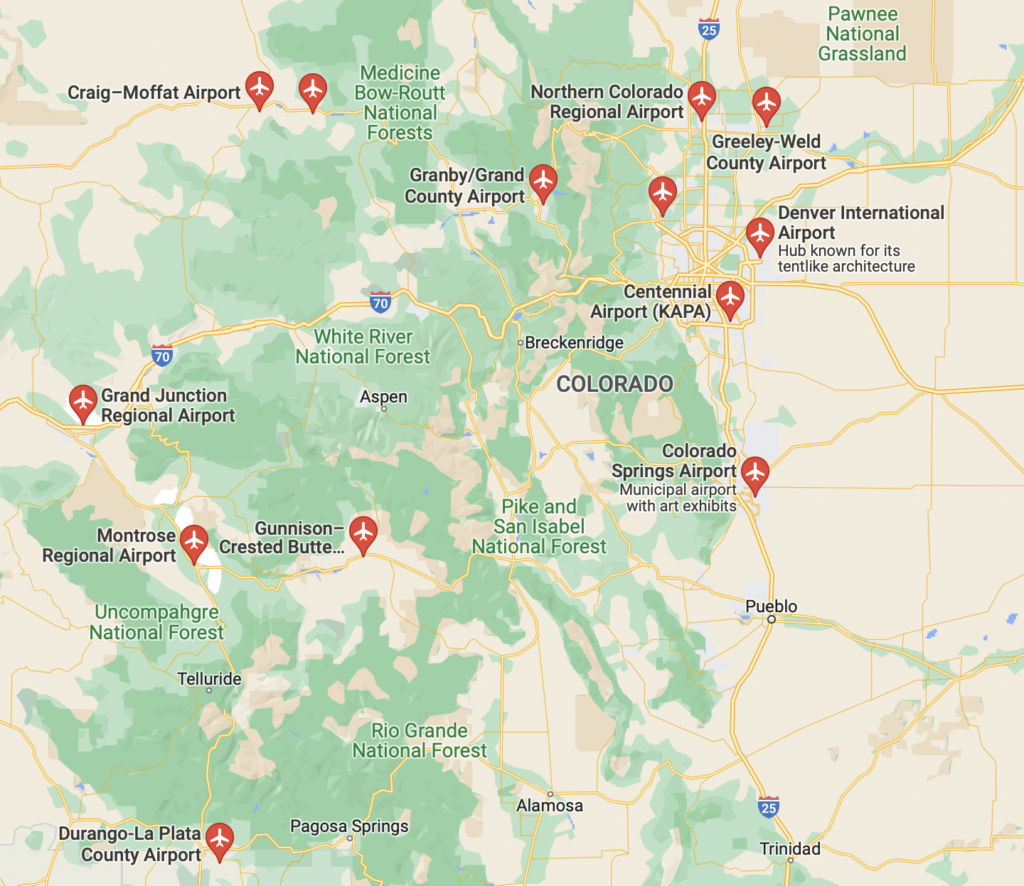
Using Your Own Vehicle vs. Renting a 4×4 Vehicle
Off-roading is an exciting and adventurous way to explore the great outdoors! Whether you are interested in driving through mud and sand, or taking a challenging mountain pass, a 4×4 vehicle is the perfect way to get the job done. Renting a 4×4 vehicle is a great option for those who don’t own one, but want to experience the thrill of off-roading. If you do own a 4×4 vehicle, then it’s an awesome (and relatively easy) experience to incorporate on your elopement day!
Using Your Own Vehicle For Your Off-Roading Elopement
If you are using your own 4×4 vehicle, then you want to make sure you have the right gear and that you choose a suitable trail. First, your vehicle should be equipped with the right off-road tires and suspension. This will help ensure that your rig can handle the terrain you’ll be driving on. Second, it’s important to make sure your vehicle is in good working condition and that all of the fluids are topped off. Finally, if you’re new to off-roading, it’s important to do your research and know the rules and regulations of the area you’re driving in.
It’s important to note that even if you have a basic SUV, you may not be as limited as you think! There are plenty of 4×4 trails that will take you off the pavement and into the mountains without needing to have a souped up four wheeler. But if your vehicle is a bit more capable, (think a jeep with big tires!) then you will likely be able to explore in many more areas, and won’t be limited as much by the terrain or trail difficulty.
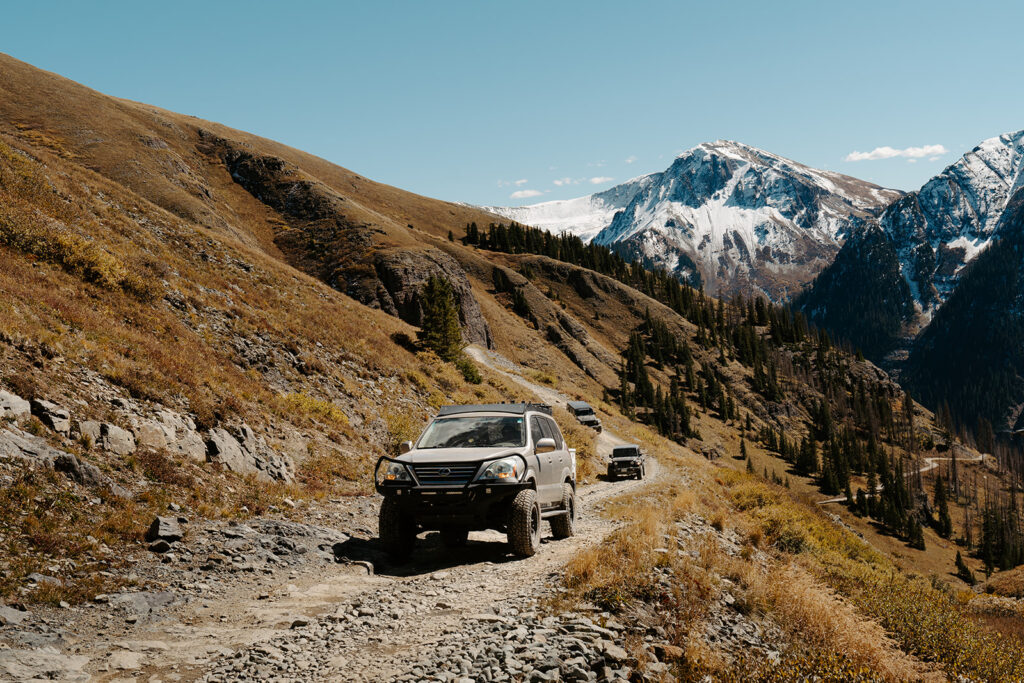
Renting a 4×4 Vehicle To Off-Road
The vehicle you rent is going to depend on the trail you choose and the type of driving you want to do. If you choose an easy trail, you may be able to rent one of the basic Jeep models. When looking at more difficult trails, you’ll want to consider renting a Jeep that is built out with a lift and bigger tires. Adam has done off-roading and often gives his own recommendations for what to rent based on his experience and knowledge of vehicles! But if he doesn’t have a suggestion, or if you want a more “professional” opinion, some rental shops also offer suggestions based on your chosen 4×4 trail.
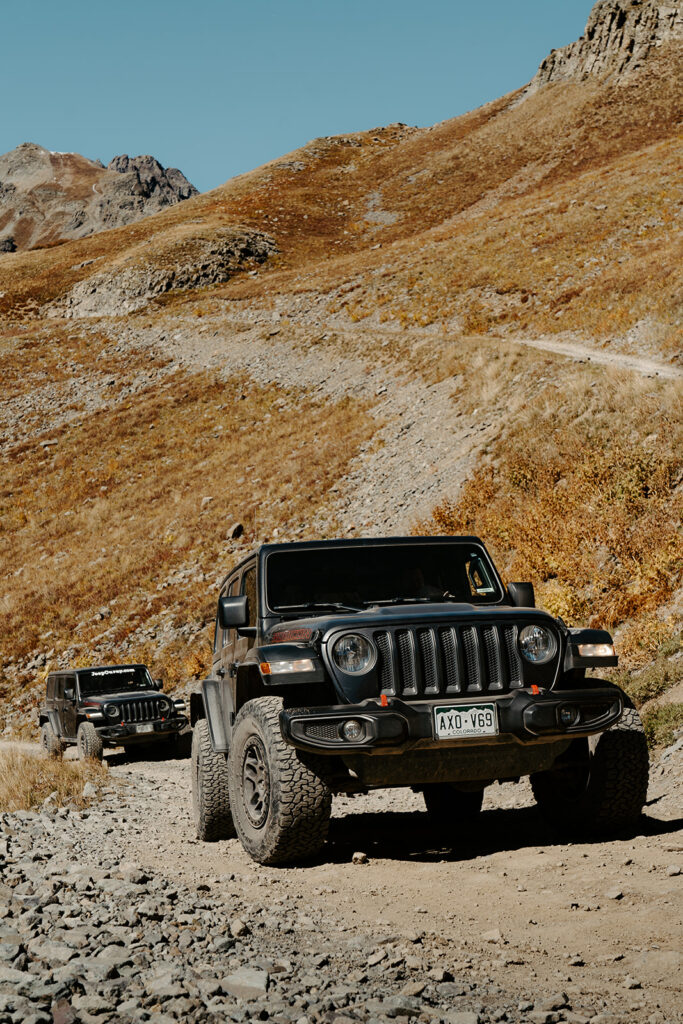
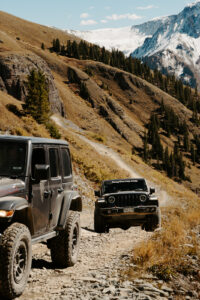
You may also consider renting a UTV, also known as a side-by-side. This can sometimes be a cheaper alternative to renting a Jeep, and it is just as fun! However when renting a UTV, you are typically required to wear a helmet + goggles, and they can be a bit different when compared to driving a normal vehicle.
Vehicle Rentals
If you’re interested in renting a 4×4 vehicle, here are some of our recommendations. We don’t have experience working with every single one of these companies, but they have great reviews online!
Telluride 4×4 Rentals
These are the rental companies that you can find in Telluride! Make sure you read through all of their policies as some allow pets and others don’t. And when looking at Diff. Jeep Rental, be sure you select the Telluride location as they have other locations across the United States.
Ouray 4×4 Rentals
In Ouray there are three other rental companies to choose from! For the elopement featured in this blog, the couple rented a couple of vehicles from Jeep Ouray and had a very good experience with them.
How Much Time Do You Want To Spend Driving?
This is a big and important topic! Before you choose your elopement location, you want to think about how much of your adventure you want to spend driving. Some off-road trails are super short, while others can be overnight adventures!
It’s also important to note that even if a road is short–let’s say 10 miles–it can take a long time. We always build in plenty of time into your elopement timeline to account for driving because if you’re only averaging 5mph on a 10 mile road, the drive itself can take around 2 hours one-way (and we’ll need to stop to photograph/film the experience as well). Your experience with off-road driving may also affect the drive time. Many new drivers will be much more cautious and take a bit more time assessing obstacles. Make sure to add this to your considerations when choosing your trail and its difficulty.
We always help our couples build in plenty of time with their off-roading adventures! You never want to feel pressured to get somewhere quickly when driving on tough terrain.
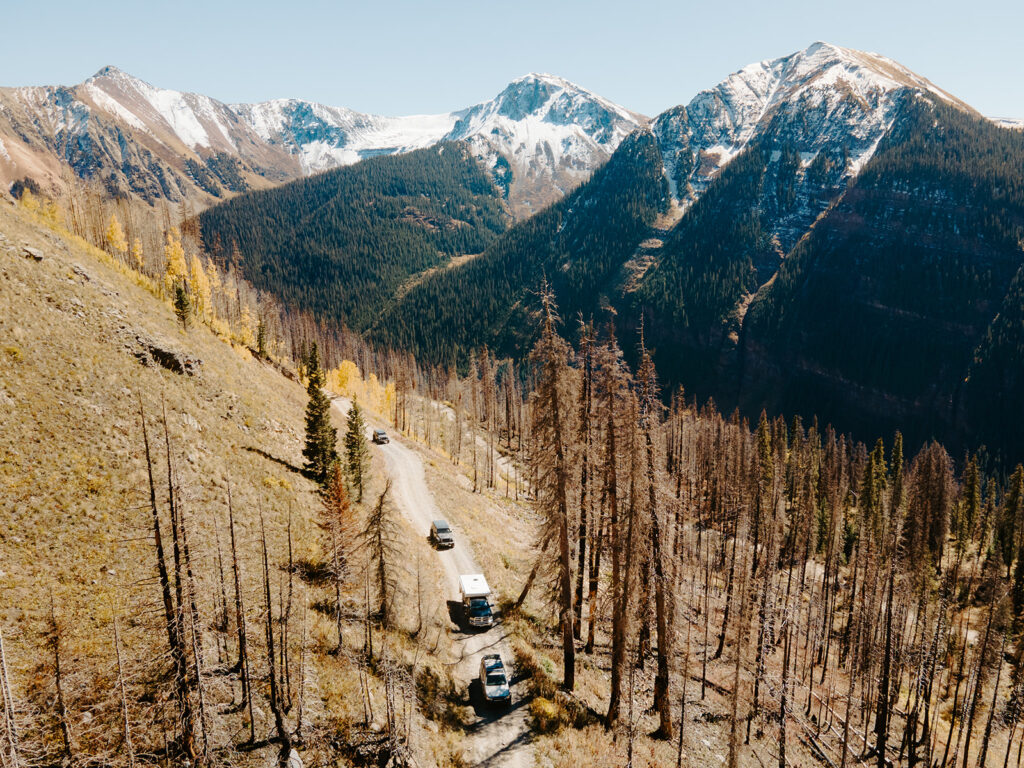
What Kind of Views Do You Want?
What we mean by this is what do you want the scenery to be at the end of your drive? Are you looking for vast, expansive views? Do you want to end by an alpine lake? These are some things to consider while looking for a suitable trail for your off-roading elopement experience. You may also want to think about choosing a through drive instead of an out-and-back trail. Being able to go from Point A to Point B without having to return back to Point A may allow you to see everything you’d like without having to sacrifice as much time. Plus, you might be able to see another town at the end of your trail as well! For example, there are many trails that take you from Ouray to Telluride, as well as a few small towns in between.
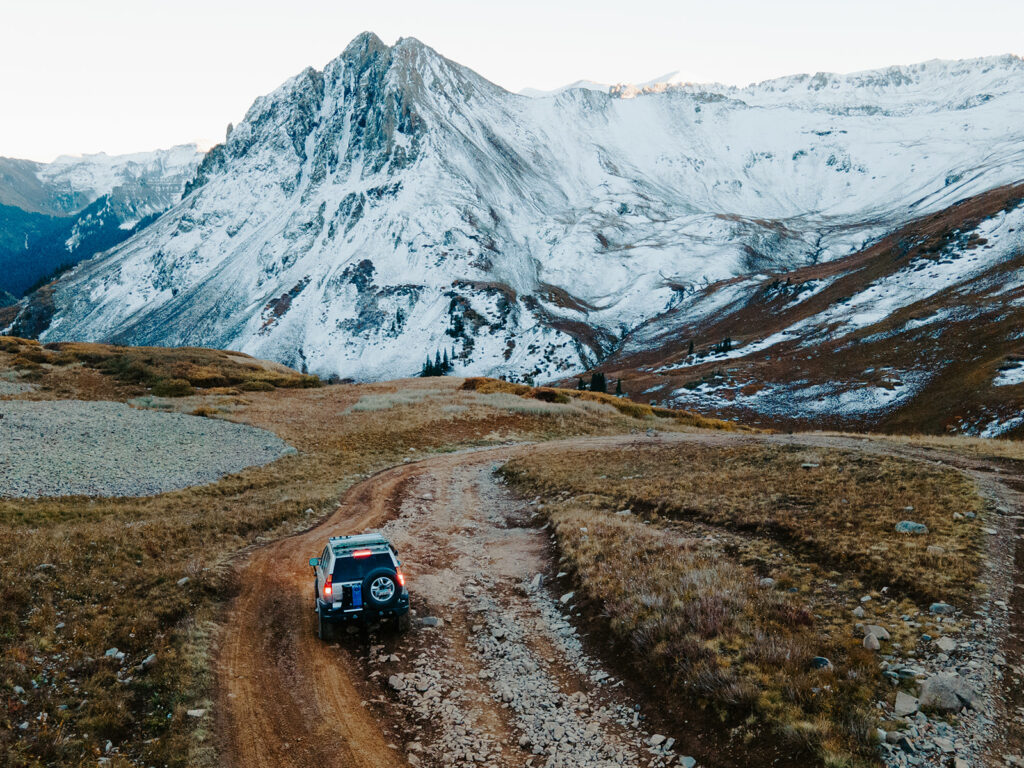
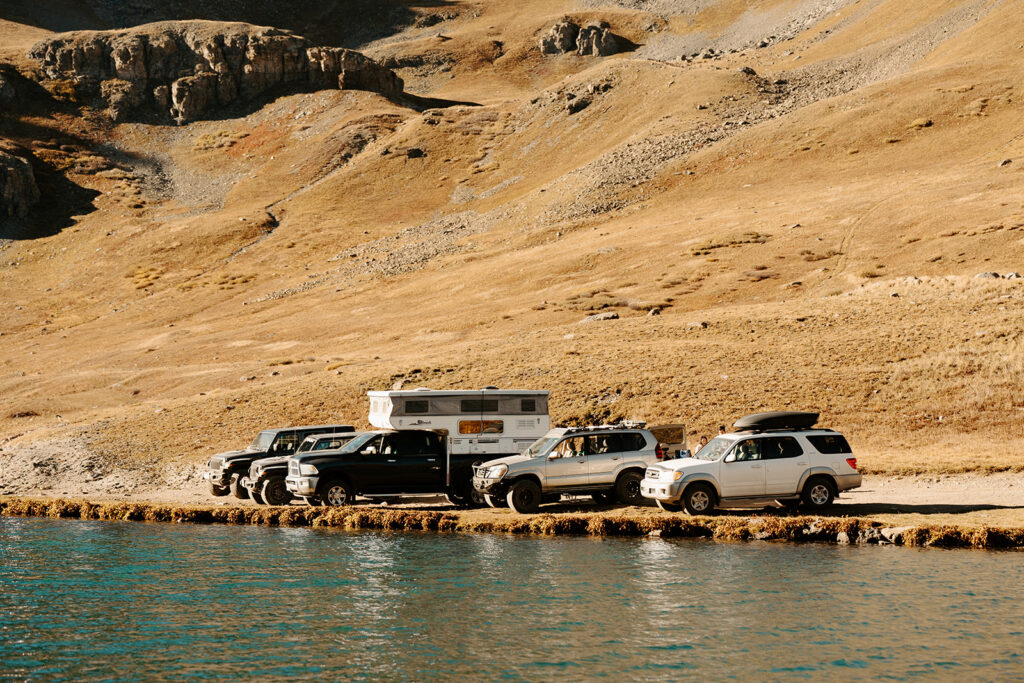
Will You Also Be Hiking?
There are many 4×4 roads that end at a hiking trail. This could give you the opportunity to have two adventures on your elopement day (off-roading and hiking). Not only that, but if the hiking trail has different views that your 4×4 road, you get to experience more of Colorado’s beauty!
Safety Gear For Any Off-Roading Adventure
When off-roading, it is important to have the right safety gear. We will always carry safety gear, but every vehicle should have these things:
1. Ten Essentials: Along with a first aid kit, you should always have the 10 Essentials when adventuring outdoors. The 10 Essentials are: navigation, sun protection, insulation, illumination, first aid kit (REI has a good premade kit), fire, repair kit and tools, nutrition, hydration, emergency shelter.
2. Communication Device: Having a communication device such as a walkie talkie can help you stay in touch with other vehicles on the trail and call for help if needed.
3. Satellite Radio: Most 4×4 trails will not have service. It’s important to have a satellite communicator, so that you can call for help if necessary. We love using our Garmin inReach when we don’t have service!
4. Shovel: Having a shovel can be helpful in recovery situations. It can also double as a way to dig a hole when going to the bathroom outdoors!
5. Spare Tire: A spare tire is essential for replacing a flat tire on the trail. You should always have one of these on hand! And it’s a good idea for everyone in the vehicle to know how to change a tire.
6. Tow Straps: Tow straps are important for towing your vehicle in case it gets stuck.
7. Off-Road Lights: Off-road lights are important for seeing in dark and low-visibility conditions.
8. Recovery Gear: Recovery gear such as winches, shovels, and traction mats can help you get unstuck if you get stuck in mud or sand.
9. Off-Road Jack: An off-road jack is important for lifting your vehicle in the event of a breakdown.
10. Fire Extinguisher: A fire extinguisher is important for putting out any fires that may occur while off-roading.
Bonus: It’s not a bad idea to have a helmet, goggles, gloves, boots, and long pants if you’re in a Jeep without doors or driving a UTV. These things can help protect you from a crash, debris/dust, hot engine parts, or sharp objects on the trail.
Book Your Off-Roading Elopement
Looking to chat about and book your off-roading adventure elopement with us? We’d love to hop on a call and hear more about the vision for your day! Inquire through the button below. Looking forward to planning your 4×4 wedding!
Leave a Reply Cancel reply
Hannah and Adam are a Montana and PNW-based Elopement Photographer + Videographer Team traveling across the US and abroad to capture couples' special days. They firmly believe love is love, Black lives matter, and in respecting our planet.
home about experience Travel pricing Portfolio blog contact
COPYRIGHT © VENTURE TO ELOPE 2025
